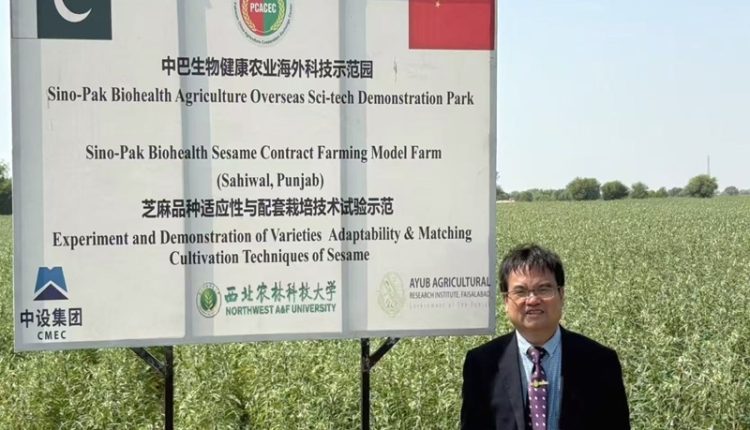Islamabad, Nov 4 : “This year’s sesame varieties were selected by the expert, and with the accompanying planting techniques, my sesame is now of high quality and high yield, which can also be exported to generate income,” China Economic Net (CEN) reported on Tuesday.
Sesame is one of Pakistan’s traditional crops, with Punjab province as the largest sesame-producing region in Pakistan.
Historically, local varieties have suffered from slightly weaker resistance to adverse conditions, lower yields, and significant annual yield fluctuations.
In the fields of Sahiwal, Arif Rafiq Farista could be seen busy putting bags of plump sesame seeds into storage, with joy evident on his face.
Professor Zhang Lixin from Northwest A&F University (NWAFU), whom Arif referred to the Chinese expert, co-founded the Silk Road Bio-Health Agriculture Industry Alliance in 2017.
From the initial three Pakistani member units, it has now grown to 13 member institutions covering Pakistan’s main agricultural production areas, continuously expanding the bridge for Sino-Pakistani agricultural science and technology cooperation.
Today, the two countries have established a cooperative framework with Faisalabad Agricultural University and Ayub Agricultural Research Institute as the demonstration areas, as well as the Islamabad Pakistan Agricultural Research Council, Rawalpindi Dry Agriculture University, and Sindh Agricultural University as the main entities.
“After repeated experiments, our team has successively screened out three sesame varieties, SZ02, SZ06, and SZ07, which can increase yield by more than 40% compared with local varieties; the three local suitable varieties, TS3, TS5, and TH6, have increased yield by more than 20% compared with the control group varieties,” Zhang told CEN.
From compost to bio-nano fertilizer, from tillage to bio-stubble mulching and no-till technology; from flatland planting to ridge planting, improving drainage while increasing root aeration…
Dr. Rana Ashar and Dr. Saad Ahmed, who are in charge of sesame field management, gave a detailed introduction to the various new technologies introduced by the Chinese team.
“Thanks to Professor Zhang’s team, and relying on the joint oilseed laboratory of the Ayub Agricultural Research Institute and the joint bio-health smart agriculture laboratory of Faisalabad Agricultural University, we have introduced high-quality Chinese sesame varieties and supporting cultivation techniques, thus led the formulation and release of the Pakistan Bio-Health Sesame Production Technology Standards,” said Dr. Rana Ashar.
The contract farming model promoted by China Machinery Engineering Corporation (CMEC) in Pakistan has also contributed a lot to the local sesame industry.
Within the bilateral supply chain, harvested sesame seeds undergo primary processing at CMEC’s processing plants, followed by sampling and quality testing in a jointly built lab.
Subsequently, qualified products are exported to China for further processing and application in food, pharmaceutical, and industrial sectors.
By now the project has established 12 standardized bio-healthy sesame farms, totaling approximately 500 acres. These farms utilize a contract farming model and have contracted with over 120 farmers.
“Last year, the first batch of sesame planted under the contract has exported approximately 3,500 tons to China; by 2025, our goal of processing and exporting 5,000 tons of sesame seeds is expected to be achieved soon, all of which will not only drive increased production, quality, and income for the farm and surrounding small and medium-sized farmers, but will also provide over 500 long-term jobs for the local community.” Zhang stated.
And the near-term goal of the farm is to gradually expand its area to over 50,000 acres (with a planned yield of approximately 23,000 tons), representing over 5% of Pakistan’s total sesame planting area.

